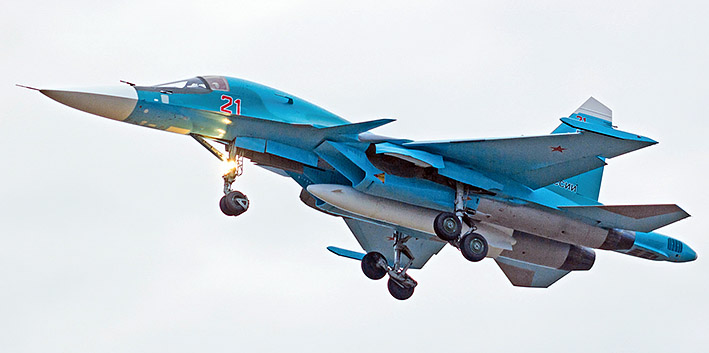|
 Six Su-34 multirole tactical bombers were delivered to the Defence Ministry in a ceremony at the Sukhoi company's Novosibirsk Aircraft Plant on 15 October 2014. The planes were fielded with the bomber air regiment stationed at Morozovsk AFB in the Rostov Region, where the previous-generation Su-24M tactical bomber fleet is being replaced now. Six Su-34 multirole tactical bombers were delivered to the Defence Ministry in a ceremony at the Sukhoi company's Novosibirsk Aircraft Plant on 15 October 2014. The planes were fielded with the bomber air regiment stationed at Morozovsk AFB in the Rostov Region, where the previous-generation Su-24M tactical bomber fleet is being replaced now.
The Su-34 entered the inventory of the Russian Air Force under a 20 March 2014 resolution of the Russian government, thus having completing the protracted and complicated development and testing of the advanced aircraft that will considerably influence the future of the tactical aircraft fleet of the Russian Air Force for many years to come.
Mention should be made that the Su-34 is the first advanced warplane, which acquisition RusAF has started in the post-Soviet era. The early production-standard Su-34s were delivered to the Defence Ministry in late 2006, but the type had faced several years of the official trials yet. Now, they have been completed, having proved the full compliance of the Su-34's characteristics and combat capabilities with the customer's requirements specification.
The RusAF combat units, which had earlier operated the Su-24M tactical bombers, began to convert to the new-generation Su-34s in 2011. Under the three current government-awarded orders, RusAF shall have received almost 130 aircraft of the type until 2020, with up to 50 having been fielded to date. After the collapse of the Soviet Union, the Russian Defence Ministry has never bought so many new combat aircraft of any type. RusAF's overall Su-34 requirement is estimated at 150-200 aircraft, and, probably, their acquisition will go on past 2020. Hence, new governmental orders for the type could be landed by the end of the decade.
The first batch of production-standard Su-34 was ordered for the Defence Ministry in February 2006. In all, Sukhoi's aircraft in Novosibirsk made five production-standard aircraft under the contract during 2006-2009. The first of them was given to the State Flight Test Centre in Akhtubinsk in December 2006. The second one went to Lipetsk in August 2007, followed in December 2008 by the third aircraft that later joined the official test programme under way in Akhtubinsk. The last two aircraft of the batch were received in Lipetsk in December 2009. By then, in December 2008, the customer had signed the report on the first phase of the official trials that had proven the conformance of the Su-34's characteristics to the Air Force's requirements specification. At the same time, a five-year deal was clinched by the government and Sukhoi for a 32-ship batch of Su-34s to be delivered during 2009 through 2013.
Meanwhile, the official tests carried on. Their second phase, dedicated mostly to testing the whole weapons suite of the advanced aircraft, was to be wrapped up. The final flights under the official test programme's second phase took place in April 2011, and November of the same year saw the Su-34 development, which dated back to 1989, completed at last. The advanced tactical fighter-bomber was cleared for fielding with RusAF's combat units.
The first four aircraft built under the 2008 contract were delivered in December 2010. A decision was made to station them in Lipetsk until the official fulfilment of the official joint test programme. In Lipetsk, the planes were used for the conversion of the flying and ground crews of the first combat unit slated for conversion from the Su-24M to Su-34. At the same time, the advanced aircraft was subjected to the operational evaluation, and research pilots used the flights on the type to devise and test manuals on the warplane's maintenance and tactics.
The plant in Novosibirsk churned out six more production-standard Su-34s in 2011. They were delivered in December of the same year and then were ferried directly to the combat unit stationed in Voronezh. At the same time, the first four aircraft went to the unit too. Thus, there had been 10 production-standard Su-34s in Voronezh by late 2011.
Then, the Novosibirsk plant ramped up the Su-34 output, having delivered 10 units in 2012 and 14 in 2013. According to RusAF Commander-in-Chief Lt.-Gen. Victor Bondarev, the plans for 2014 stipulate the manufacture of 16-18 Su-34 more. The 2008 contract for 32 aircraft was fulfilled last autumn, and the plant got down to fulfilling a new order for 92 Su-34s until 2020, placed by Sukhoi in February 2012 - the deal unprecedented in terms of volume and cost.
In October 2013, the delivery of the 24th Su-34 to Voronezh finalised the activation of two air squadrons there, designed for conversion to the type. The follow-on aircraft were earmarked for a next unit, the bomber air regiment at Morozovsk AFB in the Rostov Region. The first nine Su-34s were brought there in November and December 2013, including the first two made under the new 2012 deal.
Six more aircraft of the type were ferried to Morozovsk AFB in June and July 2014. The October delivery of the next six bombers has brought the number of Su-34s in the regiment's fleet to 21. The Morozovsk-stationed regiment shall have completed its conversion to the type by year-end and will be followed by other RusAF units still operating the previous-generation Su-24M.
(Photo: Ilya Soloviev)
|
